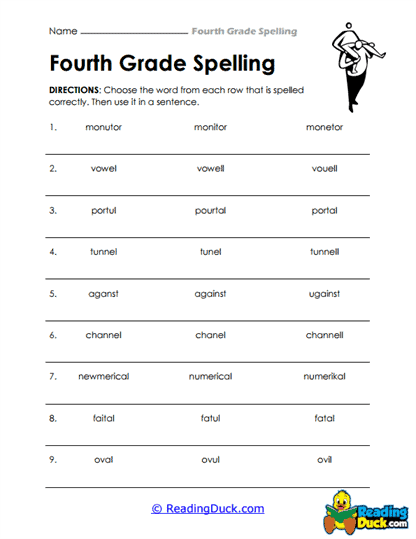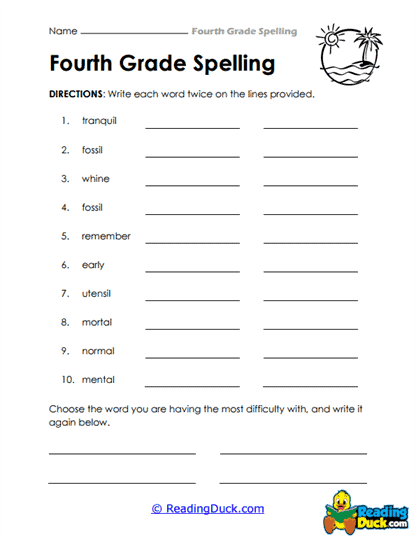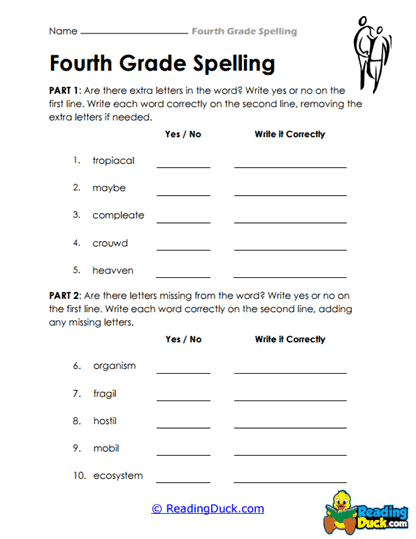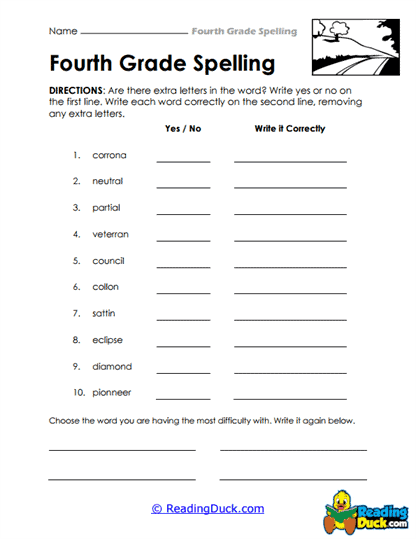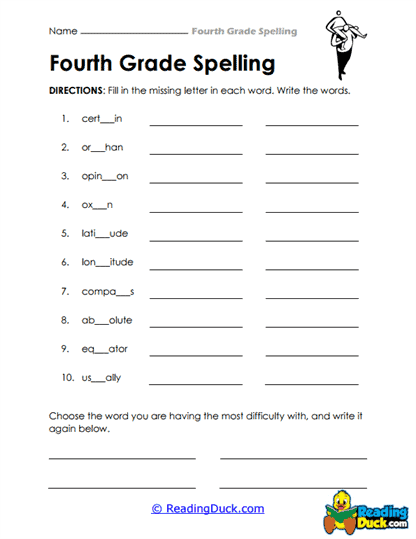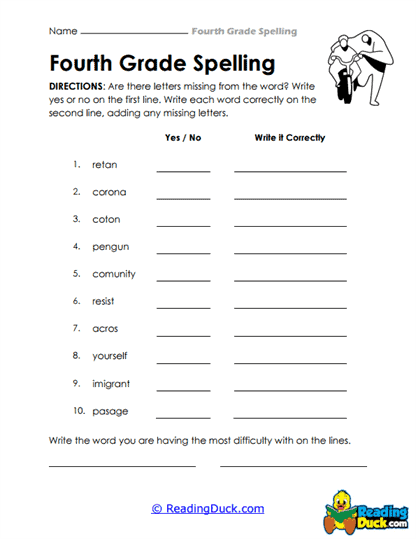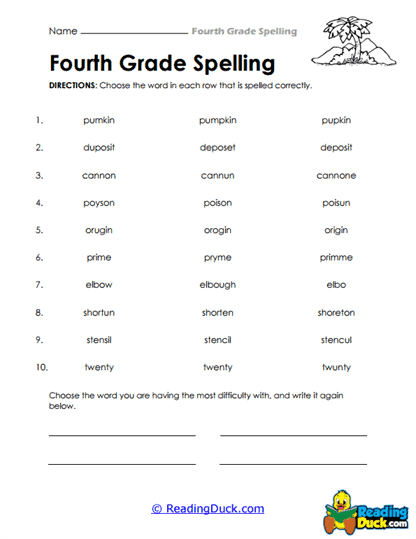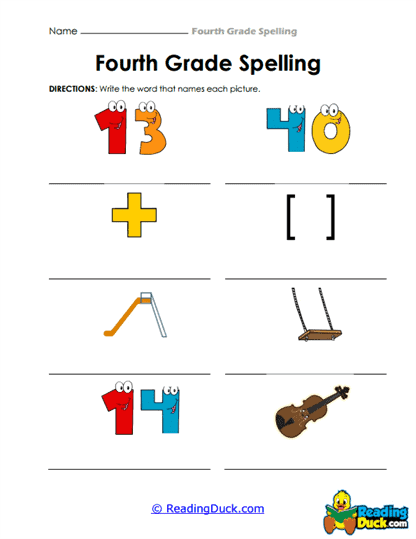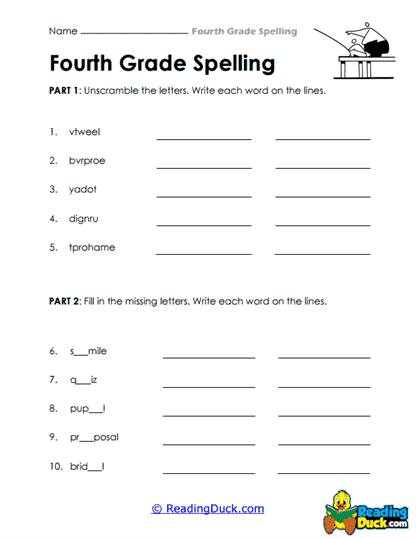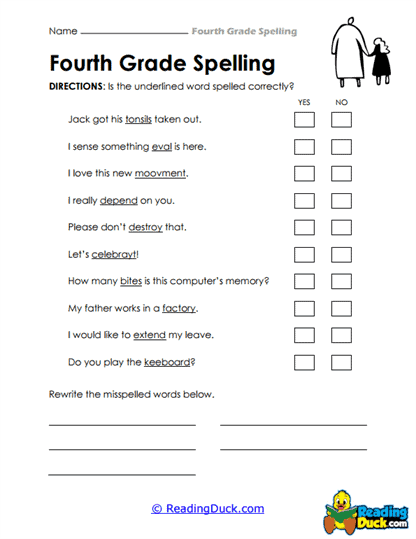4th Grade Spelling Worksheets
About Our 4th Grade Spelling Worksheets
Our collection of 4th Grade Spelling Worksheets, found under the Spelling category in the Skills section, is carefully designed to advance students’ spelling abilities. These worksheets provide targeted practice, supporting learners as they encounter more complex word structures, spelling rules, and vocabulary. Each worksheet offers focused activities that help students refine their spelling techniques and recognize common word patterns. Available in convenient PDF format, the worksheets are easy to view, download, and print, making them accessible for both classroom use and at-home learning. Additionally, every worksheet comes with a downloadable answer key, enabling educators and parents to quickly assess student progress and provide timely feedback.
Deep Dive into 4th Grade Spelling: Understanding the Core Concepts
Fourth-grade spelling marks a significant step forward in a student's language development. At this stage, students move beyond basic phonetic spelling and begin mastering more complex patterns, rules, and exceptions. Spelling in 4th grade helps build literacy skills that are essential for effective communication and academic success.
Introduction to Advanced Spelling Patterns
In 4th grade, students encounter a variety of spelling patterns that differ from the simpler word structures learned in earlier grades. These patterns play an important role in expanding their vocabulary and comprehension of the English language.
- Vowel Combinations and Diphthongs: Students learn more about vowel teams, such as "ou" in "mouth" or "ea" in "bread." They also explore diphthongs, which are sounds formed by the combination of two vowels, like "oi" in "boil" or "ow" in "cow." Understanding these patterns helps students spell words with more confidence and accuracy.
- Consonant Blends and Digraphs: Fourth graders build on their knowledge of consonant blends (like "bl" in "black" and "str" in "street") and consonant digraphs (such as "ch" in "chair" and "th" in "this"). These combinations help students spell more challenging words by recognizing familiar sound patterns.
Mastering Spelling Rules and Exceptions
By 4th grade, students are introduced to key spelling rules that are essential for more advanced writing. However, they also begin to tackle the exceptions to these rules, which can make spelling tricky.
- Adding Suffixes: One common spelling rule for 4th graders is how to handle suffixes. Students learn to add suffixes like "-ing," "-ed," or "-ly" to words without changing the base word's spelling, such as in "hoping," "danced," and "quickly." They also explore when to double the final consonant in words like "stopping" or "running."
- Irregular Spellings and Exceptions: In addition to mastering rules, students encounter words that don’t follow typical patterns, such as "their" and "they’re" or "receive" and "believe." Learning these irregularities challenges students to rely on memorization and repeated practice to master spelling.
Vocabulary Expansion Through Spelling
Spelling instruction at the 4th-grade level directly contributes to vocabulary growth. As students are exposed to more sophisticated words, they simultaneously enhance their understanding of word meanings, structures, and usage.
- Root Words, Prefixes, and Suffixes: Students learn how root words can be modified with prefixes (such as "pre-" in "preview") and suffixes (such as "-less" in "hopeless"). Understanding how these affixes alter a word’s meaning enables students to spell more advanced words and expand their vocabulary.
- Synonyms, Antonyms, and Homophones: Fourth graders begin to spell words within the context of synonyms and antonyms, such as "happy" and "joyful" or "cold" and "hot." This practice helps students see connections between words, which supports spelling accuracy. They also delve deeper into homophones, such as "right" and "write" or "flower" and "flour."
Continued Practice with Sight Words
Even in 4th grade, sight words remain a crucial part of spelling practice. These high-frequency words often do not adhere to standard spelling rules, making them more difficult for students to learn through phonics alone.
- Common Sight Words: Words like "through," "enough," "although," and "island" frequently appear in reading and writing. Mastering the spelling of these sight words ensures that students can read and write fluidly without stumbling over commonly used words.
Addressing Challenges in 4th Grade Spelling
As students advance to 4th grade, they may face several challenges when learning new spelling patterns, rules, and exceptions. However, with the right strategies, educators can help students navigate these difficulties and develop strong spelling habits.
Common Challenges
- Phonetic Variability: One major challenge in 4th-grade spelling is the unpredictability of phonetic rules. Words that sound similar may be spelled differently, such as "caught" and "taught," which can confuse students as they attempt to apply consistent rules.
- Silent Letters and Irregular Words: Silent letters, like the "k" in "knight" or the "w" in "wrist," can make spelling harder for students who depend on sound-based patterns. Additionally, irregular words, such as "neighbor" or "though," do not follow predictable spelling rules, requiring extra attention and practice.
- Homophones and Homographs: Words that sound the same but have different spellings or meanings, such as "there" and "their," can pose a challenge for 4th graders, especially when they need to use these words correctly in writing.
Strategies for Success
- Spelling Rules Charts: Creating visual aids, such as spelling rules charts, can help students internalize key rules and exceptions. For example, a chart might illustrate the "i before e except after c" rule and show exceptions like "weird" and "seize."
- Memory Aids and Mnemonics: Mnemonics, such as “Big Elephants Can Always Understand Small Elephants” to remember the spelling of "because," help students recall tricky spelling patterns and rules.
- Contextual Practice: Encouraging students to use their spelling words in sentences, paragraphs, or creative writing exercises reinforces spelling in context. This approach makes it easier for students to grasp the meaning and usage of new words.
Defining Characteristics of 4th Grade Spelling
The 4th-grade spelling curriculum is designed to challenge students with more complex word structures, while reinforcing the spelling foundations they have previously built. The key characteristics of 4th-grade spelling reflect this balance between expanding vocabulary and mastering rules.
Features of 4th Grade Spelling
- Multi-Syllable Words: Fourth graders work with longer words that often contain multiple syllables, such as "environment" and "independent." This helps them develop the ability to spell more complex words accurately.
- Advanced Prefixes and Suffixes: Spelling words that include advanced prefixes like "un-" and "dis-" and suffixes like "-tion" and "-ment" become a focal point. Understanding how these affixes change a word’s meaning strengthens students' spelling skills and vocabulary.
- Focus on Homophones: Students focus heavily on homophones, ensuring they can distinguish between words like "principle" and "principal" or "affect" and "effect." This aspect of spelling is critical for clarity in writing.
Sample 4th Grade Spelling List
- neighbor
- environment
- beautiful
- through
- thought
- responsibility
- believe
- separate
- receive
- calendar
Fun and Engaging Spelling Activities for 4th Graders
To reinforce what students learn from spelling worksheets, incorporating interactive activities is crucial. These activities keep spelling practice engaging while allowing students to explore the subject in different ways.
Classroom Activities
- Spelling Bees: Organize friendly spelling competitions where students are challenged to spell words aloud. Spelling bees promote active learning, encourage participation, and help students gain confidence in their spelling abilities.
- Word Sorts: Have students sort words based on spelling patterns, such as grouping words with silent letters (e.g., "knight," "wrist") or words with common suffixes (e.g., "happiness," "careless"). This helps students see patterns and internalize spelling rules.
- Spelling Journals: Encourage students to keep a spelling journal where they write sentences or stories using their spelling words. This practice reinforces spelling in context and fosters creativity.
Homeschool Activities
- Word Scavenger Hunts: Organize a word scavenger hunt where students search for objects around the house that match their spelling words, helping them connect physical objects with written words.
- Flashcard Games: Create flashcards with spelling words on one side and definitions on the other. Use the flashcards for fun memory games, where students try to match the words to their meanings or use them in sentences.
- Online Spelling Games: There are many online resources that offer interactive spelling games for 4th graders. These games can reinforce learning while keeping the activity fun and engaging.
These activities, tailored to 4th-grade students, make learning spelling more interactive, enjoyable, and effective.
The Practical Importance of Spelling in a Student's Life
Mastering spelling at the 4th-grade level is more than just a classroom exercise—it is a critical skill that impacts both academic and personal success. Accurate spelling improves reading fluency, comprehension, and writing quality. In academic settings, good spelling contributes to clearer communication, helping students articulate ideas without distraction from errors.
Beyond school, spelling is an essential life skill. Whether writing emails, filling out forms, or creating professional documents, being able to spell accurately is crucial in various aspects of personal and professional life.
In summary, the 4th Grade Spelling Worksheets collection provides students with a structured and effective way to improve their spelling skills. With a focus on complex word patterns, advanced spelling rules, and vocabulary expansion, these worksheets lay the foundation for continued language development. By mastering 4th-grade spelling, students equip themselves with the tools they need for success in both academic and everyday contexts.
